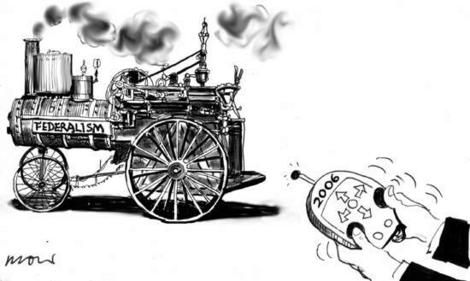|
July 11, 2006
Julian Leeser, Executive Director of the Menzies Research Centre, recently argued that the states need to lift their game to keep the commonwealth out of their patch. He says the solution to federalism lies with better performing, competitive state governments not the centralism favoured by big business.

Alan Moir
Leeser says that whilst state finances have improved with the GST their service delivery is weakerand their management often poor, whilst the reform agenda at state level has atrophied. It is hard to disagree. The states have not performed strongly. They continue with their tendency to "blame the feds" when things go wrong. In refusing to take full responsibility for what they do, the states demand federal assistance and the finger of blame is swiftly pointed at Canberra whenever something's missing that money might buy. The states need to make a determined effort to meet their responsibilities and obligations.
In arguing his case Leeser returns to Sir Harry Gibbs co-ordinate model of a federation. This holds that:
...there should be two levels of government, each of which is limited to its own sphere, but neither of which is subordinate to the other. There must be a division of powers, effected by a written Constitution which binds both levels of government, so that neither has absolute sovereignty. Each level of government should be independent and supreme within the area of its powers, and each should have under its control the financial resources necessary to enable it to perform its functions.
This coordinate model of federalism is one where two levels of government each have separate powers and functions. It is generally held that this understanding of the federal system is one that the framers of the Constitution had established----it suggests that each level of government was to be independent of the other and hence it places limits on Commonwealth power.
This coordinate model of federalism is one that has been rejected. Whilst it has been in decline thoughout the 20th century there has been a recent upsurge in cooperative federalism --cooperation between the Commonwealth and the States. Leeser says that:
Those who wish to see a stronger role for the States and a revitalised federalism have tended to suggest three solutions: constitutional amendments to increase the power of the States or retard the power of the Commonwealth, the appointment of federalist judges to the High Court, or encouraging the Commonwealth to keep out of areas which belong to the States. The first is unlikely because under the Constitution the Commonwealth must propose a referendum and a Commonwealth Government is unlikely to propose a referendum to give more power to the States. The second is difficult because most candidates for judicial appointment have never expressed views on this subject and, following the precedent set by WM Hughes and AB Piddington, it is probably unethical to ask. The final suggestion is also unlikely especially if States perform poorly as they have in recent years.
He adds that there is another way to bolster federalism --- from the State side. The better the State governments perform the less the Commonwealth will be inclined to interfere with their powers and responsibilities.
|

The fourth alternative is an internationalist premier like Jack Lang get elected who isnt scared to play rough with the feds.
Taking back income tax for the states would be a nice shock to the Commonwealth Government and re-assert state authority.
Income tax is by agreement, not legislation, and the emergency of WWII is long past. Explained correctly, and with a nice tax cut to boot, I am sure voters would understand.